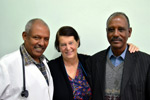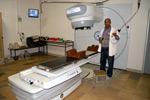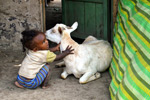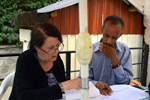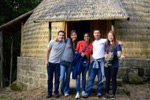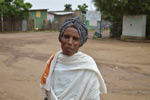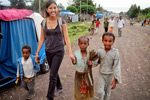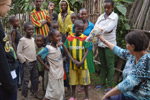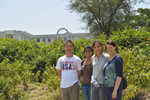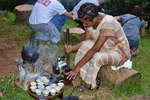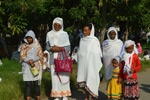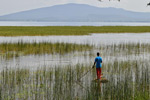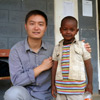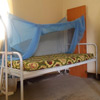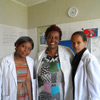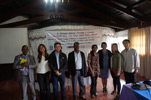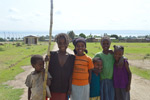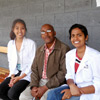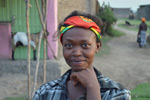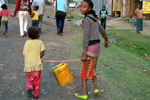

Battling Breast Cancer in Ethiopia
Addressing Breast Cancer in Ethiopia
When Dr. Carol Harris arrived for an early morning meeting this summer at Black Lion Hospital in Addis Ababa, Ethiopia, dozens of weary patients and their families huddled together in dark stairwells, or on wooden benches lining the hallways outside the dimly lit oncology ward. One patient lay motionless, shrouded in a colorful sheath, surrounded by family.
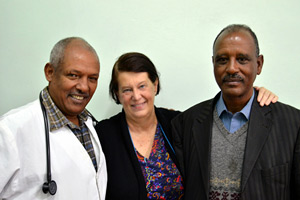
(From left) Drs. Aynalem Abreha, Carol Harris and Agonafer Tekalegne at Black Lion Hospital, in Addis Ababa As Ethiopia's main cancer referral hospital, the government-run facility offers the only sliver of hope for more than 200 new patients who arrive every day from around the sub-Saharan nation. Each year, Black Lion gets about 6,000 new cancer cases, most of them poor individuals traveling from distant villages by bus, foot, bijaj, or even donkey cart.
On this rainy day at 8 a.m., the lights flickered and the radiation machine was shut down—a frequent occurrence with the rolling power outages that regularly occur.
"The lack of infrastructure and shortage of basic services is overwhelming," said Dr. Harris, as she comforted a frail woman receiving a chemotherapy infusion on one of the 18 beds reserved for cancer patients.
The hospital employs only three adult oncologists—who represent all such specialists in the nation—and endures a chronic shortage of chemotherapy drugs. It has the only working radiation machine for the entire country—with a population of roughly 90 million—requiring patients to wait up to six months for treatment of their diagnosis.
Despite no assurance of a cure, desperate families sell their livestock and even their homes to afford the trip to Black Lion, which represents their only glimmer of hope.
Recognizing a Need
A professor of clinical medicine within the division of infectious diseases and director of Einstein's Institute of Global HIV Medicine, Dr. Harris has been working with Ethiopian caregivers and leaders since 2002, when she established a global health program to address the nation's HIV epidemic. She has helped establish an expansive network of programs and services throughout Ethiopia—all focused on capacity building.
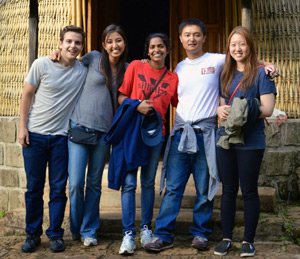
(From left) Einstein medical students Corey Fulcher, Vivy Tran, Joann Anthonypillai, Kedong Wang and Audrey Chan stand in front of a traditional Tukul hut She turned her attention to cancer in 2012, to address the growing number of Ethiopians who are living with—and dying from—a disease that has not been a priority in sub-Saharan Africa.
"Cancer is a noisy disease and it's shouting, but nobody is listening," said Dr. Aynalem Abreha, a palliative care oncologist at Black Lion with whom Dr. Harris works closely. "People go home to die because there is no treatment. Chemotherapy drugs are in short supply because the government has not listed them among essential drugs."
Seeking Change through Outreach and Education
This summer, Dr. Harris, Einstein faculty and Ethiopian oncology specialists and healthcare professionals spent more than a month bolstering an oncology education program with a focus on the country's high incidence of breast cancer. "Although it's second to cervical cancer in occurrence, it's often diagnosed too late," Dr. Harris noted.
The team sought to create breast cancer education programs, while also offering training for local doctors, nurses and other healthcare providers and establishing model treatment programs.
"The situation is really dire," said Dr. Murali Janakiram, assistant professor of medicine and an attending physician at Montefiore Medical Center, Einstein's University Hospital, who helped set up guidelines for Ethiopian physicians with no formal oncology training that would allow them to clinically stage and treat patients with breast cancer.
Offering Students Global Perspective
Five first-year medical students also joined Dr. Harris this summer, traveling to Ethiopia during their break to gather data on breast cancer awareness in the sub-Saharan country. Their work was funded by the Einstein Global Health Center, the Arnold P. Gold Foundation and the Roche African Research Foundation.
"No amount of statistics can replace what I learned from observing patients in the oncology unit and hearing firsthand how little they knew about breast cancer," said one student, Audrey Chang.
After spending one week in Addis, where they shadowed oncology residents and attending physicians, the students headed five hours south to Hawassa, the lakeside capital of the Ethiopian province of Southern Nations, Nationalities and Peoples, where Dr. Harris is helping to build an oncology ward at the Hawassa University College of Medicine and Health Sciences.
Working through translators, the students spent their days conducting interviews with several hundred patients and healthcare workers at one hospital and four health centers in Hawassa. Although there are no doctors at the four government-run facilities, local villagers come for maternal healthcare, including birthing rooms, and for adult and pediatric outpatient care.
After six weeks, working and gaining understanding of breast cancer and its challenges, the Einstein students returned to Addis to present their findings at the fifth Ethiopian National Oncology Conference, a collaborative effort between Einstein and the Ethiopian Ministry of Health, funded by Roche African Research Foundation. The two-day conference, which focused on female reproductive cancers, included 80 physician leaders from six medical universities in Ethiopia, an oncology team from Germany and the American Cancer Society.
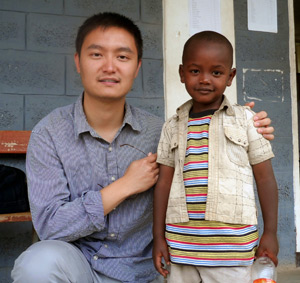
Medical student Kedong Wang with a youngster at a local clinic"Most Ethiopian women don't know about breast exams and frequently ignore lumps," said Dr. Mathewos Assefa, head of the oncology unit at Black Lion, who trained in South Africa and returned to his homeland to serve his fellow Ethiopians. "They often seek treatment at a late stage."
He added, "The current protocol is for patients to undergo a mastectomy, to try to ensure clean margins since there are few diagnostic tools. The surgery is usually performed in private clinics, with a referral to Black Lion for radiation or chemotherapy. But there are many who believe that they will die because of the cancer, and seek out holy water or other traditional medicines instead."
Making Gradual Progress
The program in Hawassa is the only oncology unit outside of Addis. "Since March 2013, the hospital has administered chemotherapy to about 60 patients," said Dr. Harris.
The unit currently focuses on raising awareness of breast cancer and providing marginal access to earlier diagnosis and treatment for a catchment area of 15 million people.
Through the capacity-building program, Hawassa's head oncology nurse Sister Alem Bekele has learned how to administer chemotherapy, complete breast cancer patient charts, and review patient cases. "Dr. Carol is our angel," said the young nurse, who advocates for oncology training for nurses. "She shows us how important it is to show our patients love and empathy."
Forging a Winning Partnership
Dr. Harris credits her success in Ethiopia to her in-country partner and friend, Dr. Agonafer Tekalegne—who is fondly called Dr. Agonafer—with whom she has worked for the last 12 years, first building the HIV program and now focused on oncology.
Dr. Agonafer arranges conferences and meetings with top government employees and health professionals around the country, schedules activities and events that are related to the program and ensures that the Einstein students who travel with Dr. Harris are immersed in the culture and kept safe.
"You cannot do this kind of work without having someone like Dr. Agonafer on the ground or you will fail," said Dr. Harris.
Student Gives and Receives
As a fourth-year Einstein medical student Maiko Kondo, now a resident at NYU, spent two months in Hawassa, where she created a detailed workflow chart that follows patients from intake through surgery, pathology and chemotherapy, and analyzes how many patients have gone through each area.
Dr. Harris hopes that Einstein students' experiences like this will inspire them and increase their understanding of work in developing countries.
"No matter what they ultimately decide to do, this experience will make a difference. But you have to be on the ground to really get it," she said.
She needn't be concerned.
"Being here has made me realize that happiness is a matter of perspective," said student Kedong Wang, recalling the satisfaction of exchanging a few simple words in Amharic with patients and meeting Ethiopian children. "While the people may not have much in a material way, they are rich in their joy for life."
"The people we met in Ethiopia made our experience especially memorable," agreed fellow student Joanne Anthonypillai, who is co-director of Einstein's Global Health Club. "They opened our eyes and enhanced our learning on so many levels."
Photo Gallery
(To view slideshow of photo gallery, click on an image below; then move your mouse over the left or right margins to navigate.)
Posted on: Friday, January 30, 2015



